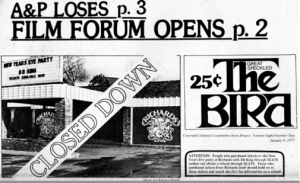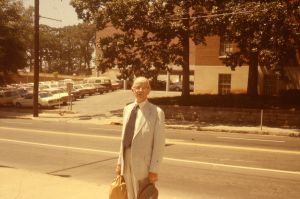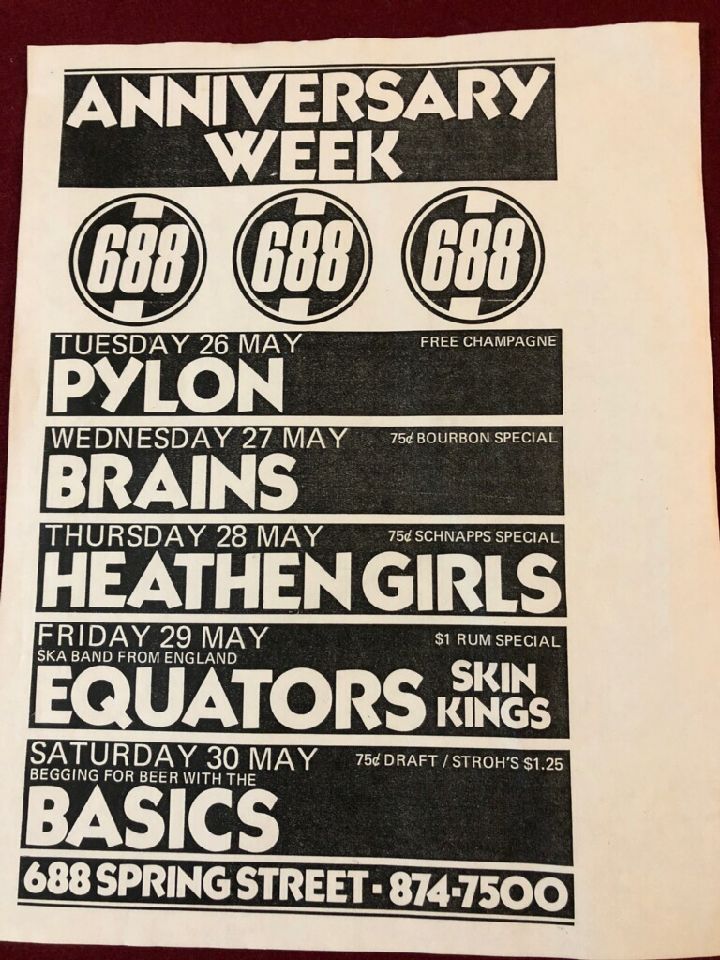 Roses Cantina on Spring later morphed into 688. Poster from Doctor Steve.
Roses Cantina on Spring later morphed into 688. Poster from Doctor Steve.
All posts by Patrick Edmondson
Richards
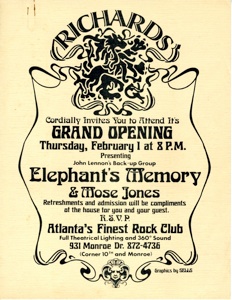 Richards opened with a bang on Atlanta’s scene. It was a sophisticated night club venue to have a rather intimate experience with a musical favorite. Unfortunately it also closed with flare.
Richards opened with a bang on Atlanta’s scene. It was a sophisticated night club venue to have a rather intimate experience with a musical favorite. Unfortunately it also closed with flare.
The Great Speckled Bird Jan. 9, 1975 Vol. #2 pg. 1
Another music club has bitten the dust. Ted Nugent and the Amboy Dukes were scheduled to play at Richards December 26-28. But when they arrived in town, no one from the club could be found. Even employees who arrived for work December 26 were surprised to find… the power cut off. Several days later the ticket window was boarded up and a sign warning about Bad Dogs inside appeared across the door. After two years’ existence and amid months of rumors, Richards has finally been closed down—forced out of business.
Rich Floyd, one of the principal partners of the operation explained to the Bird the sequence of events leading to the closing of Richards. During Christmas week the club was closed on Monday, Tuesday, and Wednesday (December 23-25) to give the employees a long vacation. It was also reasoned that few people would attend any shows on those days anyway. That week the bank decided to collect payment on a note and tried to get in touch with someone at the club to inform them of the move. Since no one was at the club to answer the phone, the bank went ahead and pulled the payment for the note out of Richards’ operating fund. As fate would have it, Georgia Power Company also decided to collect during this same week. No one answered the phones at the club, so fearing the worst (“Ye gods, they’ve absconded with all that rock ‘n’ roll money!”) the Power Company. yes indeed, cut the power. As co-day manager Diane Fraikin put it, when she arrived for work as usual on Thursday, December 26 to find the power shut off, “It knocked the socks right off me.”
At the time, the two principal owners were out of town for the holidays: Richard Bryan was in North Carolina and Rich Floyd was in New Jersey. When they were finally contacted, the drama of the whole incident finally unfolded: The power’s cut off? OK, pay the bill. What do you mean there’s no money? The bank did what?
So, by Friday, December 28, it was evident that Richards was indeed closed. Rich Floyd said it would take a lot of money to reopen the club. If someone had the money, wanted to operate the club under Richards name and even have Rich Floyd do the booking, Floyd said he would not be adverse to such an arrangement. But no one has really come up with the investment needed. “People don’t realize how much overhead is involved,” Floyd said. If the public thought Richards was making tremendous amounts of money, it was not considering the high fees that went to performers and the emphasis placed on obtaining and maintaining quality sound equipment. Unfortunately, some of the sound system was stolen when someone broke into the club when it was first evident that it had closed.
Richards was one of those few remaining places in town that would give local musicians a chance to play…for money. Although only the well established and better known local-based groups (few were from Atlanta; most came from other parts of the Southeast) were booked, still, it was another place for Atlantans to hear music by musicians living in Atlanta. Over the years the clubs that have supported local musicians exclusively or to a large degree have all died. In the early folkie days there were places like the Eighth Note, the Catacombs, the Bottom of the Barrel (became One-Eyed Jacks), the Bistro (still open and popular with its devoted clientele). The People’s Place in Little Five Points was community-oriented and lasted about a year; today the Common Cup in the Metanoia Building pursues a similar line of entertainment.
Funochio’s called itself “Atlanta’s Original House of Rock.” It provided live rock and roll in a club atmosphere. Although the bands were not big names, they were fairly decent bands from all over the Southeast (and Atlanta locals) who provided better music than found in the suburban rock clubs and singles apartment complex clubhouses. This didn’t exactly compare with the New York or Los Angeles rock scenes, but it was better than nothing, which had been Atlanta’s fate for so long.
Rich Floyd and Richard Bryan were in competition with Alex Cooley for the building at 10th and Monroe that had formerly been: Jenning’s Rose Room, Chuck’s Rathskeller, Bachelors III, and the never-opened Steve Major’s American Scene. The two Richards were able to acquire a liquor license, thus retaining a claim for the building from the owner (Roger Jennings). Previous clubs had had reputations for Mafia connections, going out of business through difficulty in obtaining or retaining liquor licenses.
The new club called Richards billed itself as “Atlanta’s Finest Rock Club.” The claim was not made idly, for the people involved put out tremendous efforts to make this come true. Mike Bone, former publicist for Richards (now doing PR for the GRC label) cited three reasons that contributed to .the club’s good reputation in the music business. Foremost were the conscientious people who worked there, like Johnny Terrell who would come in at 6 or 7 in the morning and work eight hours or more to get the club clean for that night’s shows. Diane Fraikin and Sims Hines were co-day managers, working beyond mere requirements of getting the job done. Terry Maxwell and Harold Dotson handled the sound system… Steve Demetrius was bar manager…there were the stage and light crews too. Not least of all were the waitresses “who took a lot of shit.” These people. came in six nights a week, putting up with all the crowds of people, noise and smoke, sitting through the same acts as part of their job to bring the best production for the audience.
Another aspect of Richards that Bone mentioned ‘ was an attitude to “take care of business in a Southern fashion.” Rich and Richard “tried to do things right” and made efforts to take care of the supporting act and the headliner, to “turn them on to the South,” like having dinner at Mrs. Hull’s. From a record company’s point of view, Richards had a good set-up for press parties. The blue room with the pool tables and Little Richards restaurant off of it were places to get away from the crowd and the band and do some-work with radio, newspaper, retail people, or what not.
The third element about Richards was that everyone seemed to notice right off when it opened . (February 1, 1973)—the quality of entertainment being offered to Atlanta in a club setting for the first time. Bone said that the first summer (’73) Richards made a lot of money for it was doing a lot of business. It seems that people just went wild having big name entertainment in a rock and roll club setting. Sometimes 400-500 people would be there on a slow week night like Tuesday. Even on the weekends a big act wasn’t needed to bring in capacity crowds (800). One of the highlights for Bone was the Soft Machine appearance, an “artsy” move for a club in Atlanta, and the first time they appeared in the city since the shared bill with Jimi Hendrix in 1968 at the Municipal Auditorium. King Crimson, Robin Trower, Ike Continued from cover and Tina Turner Revue, Tower of Power were the performances Bone remembers as much more enjoyable at close range than in a concert hall. The Marshall Tucker Band played at Richards during its first week of operation and before much attention was being given the band outside its hometown of Spartenburg, SC. One of Richards movements into the avant garde, so to speak,-was booking Iggy and the Stooges when there was no other place suitable, or that would have the nerve, as Bone put it, to do so.
But aside from rock ‘n’ roll, Richards brought to Atlanta some of the old blues greats: Muddy Waters, Howlin’ Wolf, Willie Dixon, and the Giant Blues Show featuring Roosevelt Sykes, Big Walter Horton, and Robert “Jr.” Lockwood. These blues performances weren’t big money makers for Richards, but the old blues men, long exploited by the white controlled music business were paid “quite well.” Many of the shows were broadcast over the college radio stations (WRAS and WREK); some were taped and used on radio stations as far away as California, but usually around the Southeast. After Funochio’s, Richards was a “step in the right direction” because of the quality of entertainment, the big names. When Alex Cooley’s Electric Ballroom opened March, 1974, this was a step even further.
Back in the Spring of 1973 , when the now defunct Twelfth Gate was undergoing its second big remodeling and grand reopening, the two managers of the small club each made significant statements in a Bird interview. Robin Feld noted that with the opening of other live music clubs that served beer and wine (the Gate did not at the time) and the lowering of the drinking age to 18, much of the Gate’s young audiences began going elsewhere. Funochio’s and Richards were two of the places that were drawing the people from the Gate. But it was not so much that these places were in competition; people didn’t take seriously the notion that you must attend all these places and support them in order for them to survive. The question then is, should Atlanta be a one club town? In a seemingly contradictory statement, co-manager Ursula Alexander (now with the Great Southeast Music Hall) said at the time that similar businesses to the Gate in Atlanta were helping it out so that it would work “Because the more places there are in the city like this, the more creative the whole environment can be.” The key, of course, was cooperative efforts.
The Twelfth Gate closed its doors for good the second week of January, 1974. Funochio’s House of Rock had died somewhere in there. Richards was almost one year old then, now Richards has also closed its doors. As his first venture in night club management, Rich Floyd does not consider Richards a failure, “The way it had to close was unfortunate, but! got a lot of satisfaction from it.” The club had been suffering a bit from the economic situation and what Floyd contended to be another factor—competition for the audience with other clubs. Richards was not his only source of income and he’ll continue to produce Howard Stein’s concerts in Atlanta. It might be interesting to start a jazz club, but Floyd thinks there would be the same problem of not enough people supporting the endeavor. Something that continues to haunt him and others associated with the club was how little recognition was given to Richards by Atlanta (especially the Journal and Constitution) for its contributions to the music scene here, like “breaking” many artists into popularity in Atlanta. Yet, national trade magazines (Billboard, Cashbox, etc., even Rolling Stone) continually mentioned Richards as being responsible for making certain artists popular with Atlanta audiences.
The closing of Richards only goes to show that if Atlanta wants to consider itself a viable contender for a music center, it has got to wake up to what is right’ under its nose.
—j.d.cade
Moonshadow
The Moonshadow was a club off Briarcliff across from Sage Hill Shopping Center.
My last show there was Sheila E, which a Prince obsessed student would have done anything to have attended.
Funochios
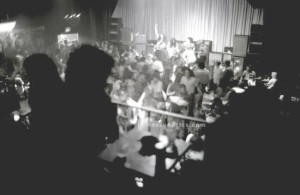
Funochios Duane Blalock- An Atlanta story and in relation to Al Kooper’s Book:” Backstage Passes and Backstabbing Bastards”
Let me tell you about my personal account in relation to the AL Kooper book listed above. In the book in 1972 Al Kooper plays at Underground Atlanta. I was there to see the show and used a fake ID to get in the club and a waitress was flirting around with me and after a while she came over and asked me how old I was? Being dumb and honest, I told her told 19. She was pissed and said that I should be thrown out, well she let me stay and I enjoyed the show.
In the book Kooper says during his stay in Atlanta he ended up hanging out with the Atlanta Rhythm Section at their studio. He had known them since they were the Candymen and backed Roy Orbison. Anyway he fell in love with the city and moved down from NY. They would jam and record and then hang out at a club on Peachtree called Funochios. There he watched the local bands play and produced and secured record contracts and started up “Sounds Of The South” label for MCA. He signed Lynyrd Skynyrd and Mose Jones, check out: www.java-monkey.com/remember-mose.htm
I used to hang out at the club and dated a girl named Lisa from there, well quite a few girls from there, but one in particular, and she also hung out(groupie) with Lynyrd Skynyrd and we’d go down early while they warmed up and they would come sit and hang out at our table. I just considered them a local band and remember remarking to Lisa that they were pretty good but “Crossroads” was not as good as Cream’s version and they showed off too much. This was before they had an album out. Attached is a picture from upstairs at Funochios and Lynrd Skynyrd playing. They did not have the piano player then and had a different drummer.
Anyway in the book, Al Kooper talks about Funochios and how there were fights and stabbings and he witnessed two shooting!
Well, at the time I was attending the Atlanta College of Art and my friend who also attended there, the late Jeff Yero, had a roommate named Mike who was also a student with us and worked as a bouncer at Funochios. He threw a guy out one night and the guy came back and shot and killed him. After that, I stayed clear of the club! Too bad Mose Jones did not make it along with other bands like Eric Quincy Tate, Kudzu and Hydra. They, by the way had a reunion and released a live album last year and you can download it on ITunes.
Maddox at For Heads Only
Murray Silver – From Elvis to the Dalai Lama
An entertaining and enlightening read.
From promoting semi-mythic legendary music events in 1969 at The Sports Arena at age 16, to writing about Jerry Lee’s cousin child-bride Myra, to being roadie for the Dalai Lama’s possessions on tour, Murray Silver has had an almost unbelievable life. And he tells it very interestingly. A book blurb says he is,” the missing link between Tom Robbins and Carlos Castenada – from Dr. Hunter S. Thompson.
The River People at The Sports Arena
Hey , Thought that this might be something that you were interested in seeing. This was the only job that we [River People] played. I had hepatitis at the time of the gig and was bedridden for the next two months. The band was comprised of John Ivey (b), John Fristoe (g, vocals), Wayne Logiudice (rhythm g, vocals) and me. Dana Douglas sang with the band also when Wayne had left. We played at the River House (where John I, John Fristoe, and Wayne Mcnatt and I were living) constantly, but no gigs. Mostly for free for the dope dealers.
When the Hog Farm was in Atlanta after the first pop festival, they parked their bus at the River House. This was the time that they promoted the first mini pop that was held in Piedmont Park. Berry Oakley and Dickey Betts were frequent visitors. Two young men who later became the Bellamy Brothers were there often as well. Many bands used to come out and play or rehearse there, B J Royal, Will Boulware and Booger, Hydra, Spencer Kirkpatrick, Bethlehem Asylum, Sweet Younguns et al.
A couple of notes on the Sports Arena gig. Fleetwood Mac was the loudest band that I had ever heard. Even louder that sitting next to the speakers at the Dallas or Atlanta Pop Festivals. I think that all of the River People were tripping on some unknown substance(s) during the performance. I don’t remember it very well, other than just being real sick. Wayne L said he looked at me and I was completely green.
Ricky Bear
12th Gate brings Captain Beefheart to The Sports Arena
You can hardly beat going to a show in the Sports Arena when it comes to things like parking the car and walking thru nightshirt dairy vibrations and approaching, across railroad tracks, that funky building with the neon bewilderment “SPORTS ARENA-DANCING” And inside: arcane trophies, painted concrete walls, wooden floor, ringside, bleachers, fans, gas station grand opening plastic pennants—and wagon wheel light fixtures that evoke a whole 1950’s Atlanta country music scene that flourished there, I’m told, with the T.V, Wranglers from T.V. Ranch-Tennessee and Smitty Smith, Cotton Carrier, Paul Rice and silent Boots Woodall. And that sports microphone hanging from the ceiling that evokes another hunk of Atlanta 50’s-60’s TV/Municipal Auditorium Essence: that whole thing with Ed Capral, Tiger Kirkland, Ray Gunkle and Freddy Blassie filing a tooth into a fang to bite all those pencil-neck, grit-eating Geek southerners while Skull Murphy tapped the steel plate in his head and hid salt for his opponents’ eyes in his trunks, and Promoter Paul Jones putting Sputnik Monroe on the card at the Larry Bell Auditorium in Marietta.
Yes, the Sports Arena is some place and there’s a new vibration layer being put down by Grateful Deads and Beefhearts. Instead of “Dim Lights, Thick Smoke and Loud, Loud Music,” working class country music/ dance hall/honky tonk/Live Atlanta Wrestling patrons the Sports Arena is becoming a gathering place for freaks, longhairs and the Woodstock Altamont generation.
Well, what’d they hear at the Beefheart/Cooder/ Booger concert? What’d you hear? I heard Booger do what sounded like the same song a number of times. Maybe they’re going somewhere with that wah-wah Urgle machine plus static drum pattern music, but right now it fails to tickle my musical fancy.
And Ry Cooder? He seemed like a real nice guy who should. find a good band to play guitar for and stop coming on with those blackface vocals. He was able to transcend this whiteboy-playin’-de-bues thing in the guitar work. There was, some real nice rock and roll there sometimes. He sure had a good looking set of holy trinity guitars: a Fender, a Gibson and wasn’t that a new series Martin D-45? Cooder’s mandolin thing didn’t work out too well, but his work on the Stones’ “‘Love in Vain” proves that he can play it fine sometimes—his break is the best thing in the midst of that Jagger-singing-de-blues vocal-(comparable to the misbegotten “Prodigal Son” on Beggar’s Banquet).
And Captain Beefheart and the Magic Band!? First of all, let me admit my prejudice in favor of musicians who just get up and play and do what comes naturally (no matter how crazy it may be). So at first I was disturbed at the “dramatic” nature of the Magic Band’s visuals—for example, Ed Marimba?) and Rockette Morton(?) coming out on stage and staring sinisterly at the people, and that choreographed double drum solo with the whistle mallet, and Morton’s shades-of-Joe Maphis-guitar jive dance frenzy (which I appreciated in the end because he never stopped—what unbelievable endurance!). But these people aren’t just any group. What they do and what they play, if reports are true, is almost totally dictated by Don Van Vliet/Beefheart. And what they do is put on a show. And what they play are incredibly tight, complex compositions. An article in Rolling Stone says Beefheart (who doesn’t read music) teaches those drum solos and guitar parts to his men lick for lick.
I never could understand any of the lyrics and my main memory of the vocals is that Beefheart could sing bass to a fog horn. But his soprano sax playing struck me as funny, irritating and great. I’ve heard very little of and know next to nothing about Coltrane/Ornette Coleman/EricDolphy/Archie Shepp approach to music, but I’ve got a feeling Beefheart may belong on that list; perhaps his real place is at the beginning of a list that is just starting to evolve. To be sure, there were times that I began thinking how incredible it would have been had they stopped a piece after those wonderful passages that just built and spronged out in cosmic power instead of continuing to the point where I’d get a little bored and start thinking about the music instead of listening to and experiencing it. But just as I would feel somewhat bored and begin to wonder what was happening, like at the intermission of “2001” the first time I saw it, they’d be back into a musical thing that would do what the Beyond Infinity Room sequence did—take me to the heart of what I sense as pure art/experience, powerful stuff that takes hold of your senses and mind and lets you go stunned into a blissful, puzzled consciousness that leads to an awareness of the weird and great things men and women can do, the power of which is only feebly conveyed by words.
Film director Joseph Losey (“Eva,” “The Servant,” “Accident”, and ” Secret Ceremony”) has said, ” Entertainment, to me, is anything that is so engrossing, so involves an audience singly or en masse, that their lives from that moment are totally arrested, and they are made to think and feel in areas and categories and intensities which aren’t part of their normal lives” (Cahiers du Cinema No. 9-American). Seeing Captain Beefheart and the Magic Band was that kind of entertainment. I’ve never heard their records, and I can’t imagine what it’s like to hear their music without seeing them do it. Anyway, I’d like to say thanks to the Captain, Rockette, Ed, Ghost-Who-Walks/Zoot Horn Rollo and the drummer whose name I don’t know. And thanx and a tip of the hat to Robin and Joe of the Twelfth Gate—fine people, may they help us enjoy more of the same quality.
—spud connah
Captain Beefheart at The Sports Arena
The Great Speckled Bird Feb. 22, 1971 Vol. 4 #8 pg. 12-13
Captain Beefheart at The Sports Arena
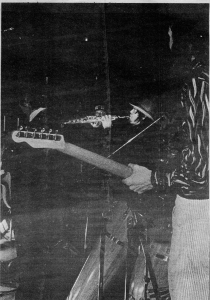 A Tuesday and Wednesday came and went. and sometime during that Wednesday everyone concerned started holding their breath because almost everyone said, Beefheart just doesn’t show for his concerts.” But Thursday came with ice and fog and no airplanes landing. Reprise/Warner said, “Monday for sure.” So again we waited with that apprehensive anticipation. The Gate was receiving calls from three states away that Monday, people making sure before making that long drive again.
A Tuesday and Wednesday came and went. and sometime during that Wednesday everyone concerned started holding their breath because almost everyone said, Beefheart just doesn’t show for his concerts.” But Thursday came with ice and fog and no airplanes landing. Reprise/Warner said, “Monday for sure.” So again we waited with that apprehensive anticipation. The Gate was receiving calls from three states away that Monday, people making sure before making that long drive again.
About 4 pm, I went over to the Arena to see what was going down and saw Ry Cooder come in, which was reassuring as I figured that he and the Magic Band were at least traveling in conjunction if not together. I left for food and inspiration, returning around seven-thirty as Booger’s equipment was being set up. Joel began testing his drums and making adjustments, Will checked his sound, turning knobs and checking wires here and there, testing with Booger riffs and somehow passing from the test stage into full song without my noticing the transition. The people were suddenly warm as the stage opened with Will and Joel’s music. Joel moving like a machine over his drums, tight and precise, carrying the music with a balanced consistency. Will’s left hand dancing across his key bass, driving a solid bottom to the blends while his right was building keyboard electric sounds so individual and absolute. Booger music is set aside from the Atlanta movement of music in its direction and pure sensitivity, and this was a real lift to get the concert off.
The crowd cooled down for the break, milling and smoking while equipment shifts were enacted. Ry Cooder was next backed by a four-piece gathering. Cooder didn’t get fully involved in the music because of the bum sound of the P.A. system, a pieced-together conglomeration nobly loaned by local bands. The set was generally down but I observed that Cooder is far better than his album and that night’s performance. His voice is more flexible and a great deal more sensitive than illustrated on the album, his instrumentation lives up to his professional reputation. But he wasn’t up to bringing his audience up except for one sweet Sleepy John blues, smooth and easy with just Ry and his mandolin. Joe Roman leaned over and said, “It’s really weird that it takes a Californian to remind us of our roots.”
Finally,.the Magic Band was due and everyone was eager for that instant of projection. Cheers and cries of “the blimp” rose as the famous top hat came from behind the amps. The Captain smiled, looking about as he plugged in his horn. Ed Marimba (Art Tripp III, of the late Mothers) walked to stage front with a sort of slapstick in his hand, zapping people with a friction ray gun from his hip pocket. Soon Drumbo joined him and together they phased through some calm but absurd theatrics that led to their respective instruments. The music began with drumsticks and plastic-tipped hammers. Captain Beefheart sitting by his wife Jan and smiling. Rhythms at the start soon coupled with Rockette Morton and Zoot Horn Rollo coming forth and the whole place is active sound, strong and basic. Rockette playing hard bass and dancing around. Rollo’s guitar like streams of colored smoke from jets. And everyone feels it as the Captain sucks in and breaks loose his bass clarinet, comes to the front of the stage and jams the horn over the mike. Sound, noise, music, a teleprompter overture of crazy color-lights that I cannot describe nor have the credits to review. Hampton said that they were three hundred per- cent better in Cincinnati—1 don’t know if I could survive that but I’d like to try. Beefheart limited his vocals due to that P.A., and only played harp once. The Gate cleared less than $200, so the concert wasn’t much of a material success’, but it was one of the strongest contributions to our music thus far. There are rumors of future Gate concerts featuring Reprise/Warner artists, which is a truly fine list to work with. I’d like to see Little Feat return to our city, as well as Jethro Tull, Van Morrison, the Dead, Tim Buckley, the Kinks, Fleet- wood Mac, Pentangle, Arlo, Doug Kershaw, Alice Cooper, Frank and the New Mothers, or the great Taj Mahal, who is new to Reprise.
—uncle tom
Contradictions among the People
The Great Speckled Bird May 4, 1970 vol 3 #18 pg 4
Contradictions among the People
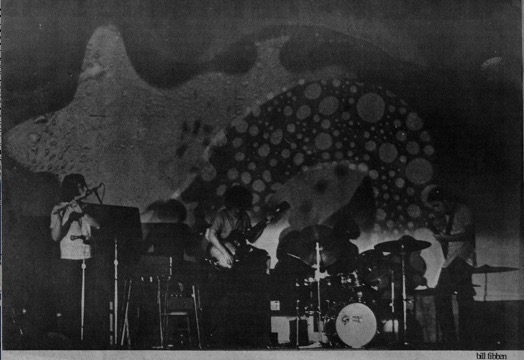 If you weren’t at the Sports Arena Sunday for the Community Benefit, you missed some good times and some terrific music. What was to have been a community happening bringing us all together around our own music and musicians-in a setting provided by people living in the community itself turned out to be a sparsely attended occupation of the Sports Arena, sleeping bags, Ripple, dope, and all the rest-just very few people. The kids-who did pay a couple of dollars for community use didn’t seem disturbed by the small numbers, however, and we had one of the best times we’ve ever had at the Sports Arena. None of the bands was less than good, some were very fine, and the Stump Brothers, with three Grease Band musicians, almost blew the roof off the building! When Hampton joined them to sing a few songs, it was too much. But how can bands be expected to play for a mere handful of people?
If you weren’t at the Sports Arena Sunday for the Community Benefit, you missed some good times and some terrific music. What was to have been a community happening bringing us all together around our own music and musicians-in a setting provided by people living in the community itself turned out to be a sparsely attended occupation of the Sports Arena, sleeping bags, Ripple, dope, and all the rest-just very few people. The kids-who did pay a couple of dollars for community use didn’t seem disturbed by the small numbers, however, and we had one of the best times we’ve ever had at the Sports Arena. None of the bands was less than good, some were very fine, and the Stump Brothers, with three Grease Band musicians, almost blew the roof off the building! When Hampton joined them to sing a few songs, it was too much. But how can bands be expected to play for a mere handful of people?
We could get into just how good the music was, but it’s more important to say quite a bit about the good thing most of the community missed out on. First of all, we have to realize that the Rock concert Sunday was organized by and for the hip community. Community Center people got their shit together and worked with Murric Enterprises, Steve Cole of Discovery, Inc., The Electric Collage, and members of the community to plan and execute what they thought would be one of the best things to happen in the Atlanta Hip Community. Some of the cream of the local Rock scene volunteered to play (they should have been paid but weren’t, for obvious reasons). Posters were made, tickets were printed up, a beautiful stage was built (designed by T. P. of the Community Center so that it can be used again anywhere it’s needed, the park, etc., or disassembled for the lumber), the Electric Collage was ready to put on one of its very best shows, a volunteer stage crew was put together (Cole said it could have been one of the best ever to work on an Atlanta Rock show), the Sports Arena was rented (they had to pay for cops they didn’t ask for, and also for a window that was broken before folks started working in preparation for the benefit, plus countless other small hassles), free transportation was arranged from the Center to the Sports Arena-and what happened? The “hip” community did not support its own benefit. Nothing hip about that. The few hundred freaks who did show up at the Sports Arena had a groovy time, but had the hall been filled, we could have raised much-needed money to go into community institutions, and the music would have been way up there with the best ever heard in Atlanta.
Week after week, kids have been paying from $3 to $6 to hear top-name groups at the Sports Arena and the Municipal Auditorium—in all that time, no one has spent the time and energy and work that went into the benefit; Murray Silver never built a decent stage, and the sound this past Sunday was the first time Rock music has been heard the way it should be heard in the Sports Arena. Are we so hung up on the star syndrome bullshit that we don’t recognize the healthiness indicated in our community by the presence of many, many fine, developing Rock bands? Bands can’t exist without audiences to hear them, and any fool can tell you that most of our local bands do much better work consistently than the lousy set that Canned Heat played at the Sports Arena a couple of weeks back, for one example.
But more than these-the work that community people put into the benefit, the together organization and coordination of the people behind it, the willingness of the Electric Collage, Discovery, Inc., and the local bands to give their time and energies to us-beyond these factors lie the simple truth that MANY OF US ARE IN JAIL! And more and more of us are going to be going to jail in the next few months. The fact that this particular benefit failed to arouse any decent community response, coming as it did after an assault upon our community by Atlanta city police and the passing of a loitering ordinance aimed at freaks and Black people (who else, in your wildest imagination, could it have been aimed at—doctors?) just makes the charge of stupidity and hiplessness that much stronger against what we like to call our “hip” community. Folks were all full of love and peace after the police riot on the strip, after the loud, noisy meetings in the park, after the ridiculous Hoffmanesque courtroom scene, and everybody was talking about how the city is on our side, how Massell weeps about what happened on the strip, etc., ad nauseum. What we didn’t know is that one of the freaks whose charges were dropped was busted for contempt by Judge Brock right in the courtroom, hastily separated from the rest of us, and practically held incommunicado in jail (in solitary because he refused to have his hair cut) while idiot hippies were talking about peace and love and how the city is on our side. Why anybody would get hung up in whether or not the city is on our side is beyond me—a lot of us are wondering whether or not WE are on our side!
Think about the fact that hard drug pushers are doing their thing in full knowledge of the police while Wayne Scott, who was trying to do something to get rid of the shit in our community, is in jail for possession of grass. Think about that fact that one of the bands that didn’t play at the benefit was the River People, and the reason they didn’t play is because they don’t exist, and the reason they don’t exist is because one of the most brilliant musicians in Atlanta, John Ivey, a beautiful cat, is serving a THREE YEAR jail sentence for a first offense of possession of marijuana plants found growing in the basement of a house he hadn’t even moved into! Some of the kids busted during the loitering police riot were really screwed in court, and some are still waiting to stand trial just for doing the right thing in the right situation.
A lot of kids don’t want to throw rocks and bottles, don’t want to fight back and don’t want anybody else to fight back. Well, that kind of thing is up to you and in a larger sense to the community, but there is absolutely no reason under the sun why you shouldn’t support your own institutions. They are merely another form of fighting back against the people trying to screw us, and the less dependent we can be on ourselves, the more dependent we are on people outside the community. Self-reliance is the only way we can prevent the loss of the community we have. Who has done more to rid our community of hard drugs? If a few thousand people had turned up at the Sports Arena Sunday, community institutions could have paid rent, bought needed supplies, expanded operations, got some people out of jail, been ready for more busts, paid all the musicians who knock themselves out giving music to the people, and a lot more, too. As it is, the community bank account isn’t all that much changed from where it was before the benefit. What is really frightening is that when community people actually took it upon themselves to canvas the neighborhood, trying to give the benefit tickets away just so the-bands would have an audience large enough to inspire them to play, most of our people wouldn’t even take the tickets for free. There’s just no way to look at this situation without realizing some very frightening things that may take even more frightening concrete forms this summer when masses of new kids come into Atlanta. Let’s hope they’re more together than those of us who already live here, because they sure as hell can’t depend on us for leadership.
A hearty “FUCK YOU!” to the Atlanta “Hip” Community, and a great deal of gratitude and appreciation to those freaks who supported the Community Benefit and who will form a nucleus for a growing and expanding hip community.
—miller francis, jr.
